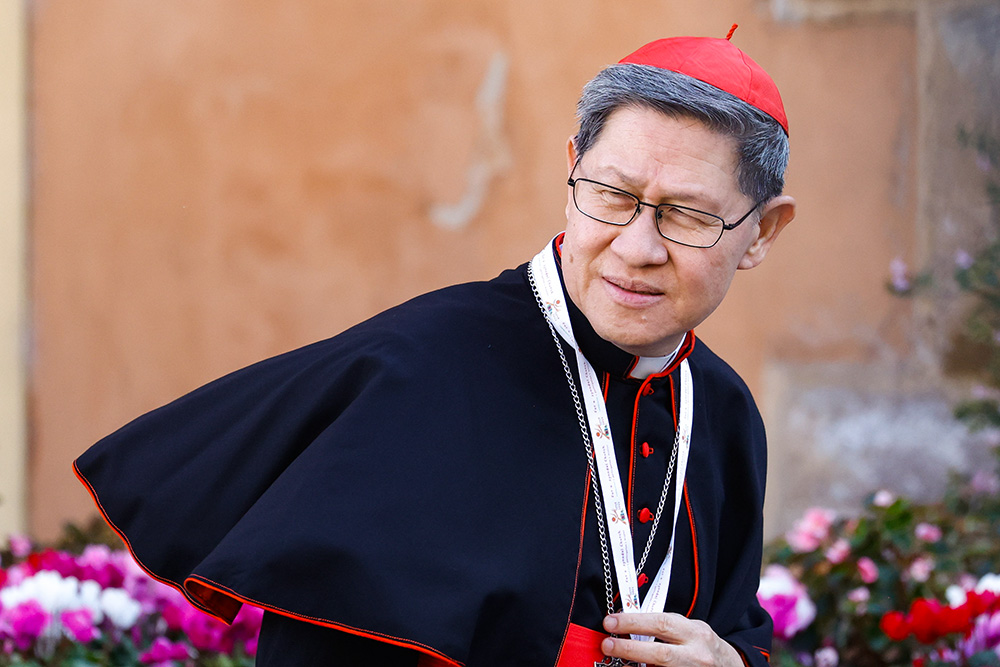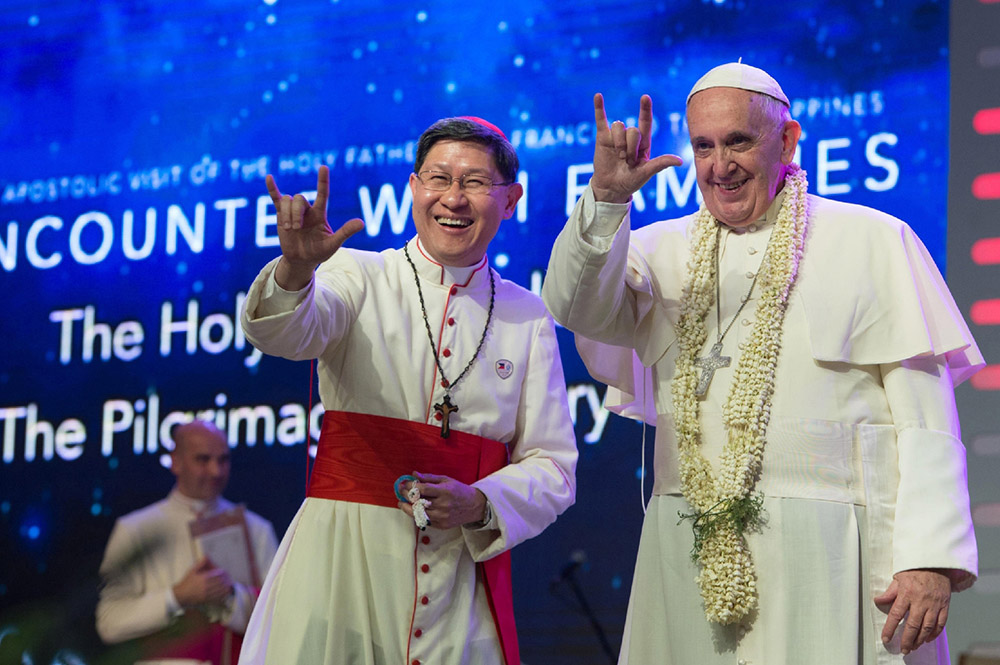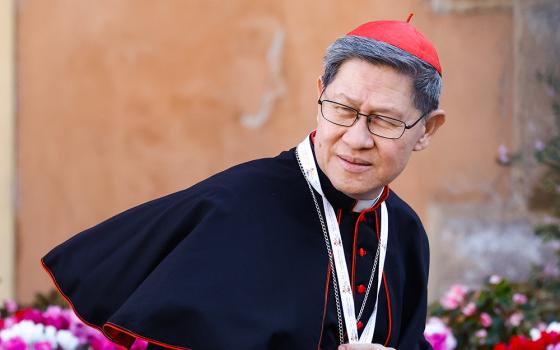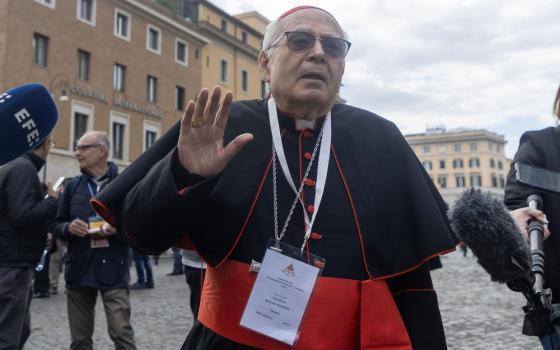
Cardinal Luis Antonio Tagle arrives for the assembly of the Synod of Bishops at the Vatican Oct. 4, 2023. (CNS/Lola Gomez)
They call him the "Asian Francis" because his personal simplicity and emphasis on the poor and marginalized mirror the life and papacy of Pope Francis. Now, Cardinal Luis Antonio Tagle is for a second time a serious contender to be pope.
In 2013, Tagle was a contender in the conclave that elected Francis. The youthful bishop from the Philippines was made a cardinal by Pope Benedict XVI just four months ahead of Benedict's shock resignation from the papacy.
Even then, Tagle's skills as a gifted communicator and as a humble man of the people — combined with his widely respected theological acumen — had landed him on many short lists.
In the 12 years since then, the profile of Tagle, now 67, has only increased in Rome and around the world, leading many Vatican observers to believe he remains a serious contender to become pope.
But as his profile has grown in stature, he's also been subjected to scrutiny that has revealed potential shortcomings and he has drawn a bevy of detractors, particularly among conservatives.
As members of the College of Cardinals consider who to succeed Francis, they may very well still be attracted to Tagle's missionary spirit. But they will weigh those against questions that have arisen over his management style.
Born in Manila in 1957, "Chito" as he prefers to be called, is the eldest child of intensely devout Catholic parents — an ethnic Tagalog father and a Chinese Filipino mother. Tagle was deeply influenced by the Jesuits, completing both his bachelor's and master's degrees at the order's Ateneo de Manila University.
From there, Tagle headed to the United States, where he completed his doctoral work at the Catholic University of America in Washington, D.C., under the tutelage of Second Vatican Council scholar Joseph Komonchak.
When Tagle returned to his homeland, he was quickly recognized as a rising star, both in the Philippines and in the Asian Catholic Church.
Tagle seems motivated more by pastoral instincts than ideology, as his close relationship with Benedict XVI attests.
In 1997, Pope John Paul II appointed him to the International Theological Commission, the Vatican's advisory body of some of the church's most trusted theologians. In that capacity, he worked alongside the commission's then-president, Cardinal Joseph Ratzinger, the future Pope Benedict.
After a few years in parish ministry, Tagle quickly ascended the ranks of the Filipino church. He went from seminary rector to serving for a decade as bishop of the Imus Diocese from 2001 to 2011. That year, he was named archbishop of the sprawling capital of Manila.
Despite seeing some decline in recent years, the Philippines remains a stronghold for Catholicism, especially in Asia, where roughly 80% of its estimated 115 million residents adhere to the faith.
Those factors combine to make Tagle the most likely candidate to be the first-ever pope from Asia.
Tagle played host to Francis during the pope's 2015 visit to the Philippines. The combination of the two men together was effectively the Catholic Church's version of a rock star concert. Francis' final Mass in Manila drew more than 6 million Catholics in what is widely viewed as the largest papal event in history.
Tagle's regular presence at the Synod of Bishops — three during the papacy of Benedict XVI and three under Francis – has provided him a chance to get to know many prelates from around the world, and a chance for the cardinals to know him.
The fact that he's a known quantity may provide him a critical advantage in a conclave where the diverse geographical membership of the College of Cardinals means that many of the men do not know each other.

Pope Francis and Cardinal Luis Antonio Tagle say, "I love you," in sign language during a meeting with families in the Mall of Asia Arena in Pasay City, Philippines, Jan. 16, 2015. (CNS/L'Osservatore Romano via Reuters)
As Francis increasingly relied on the synod process to initiate broader reforms in church life and invite greater participation from the laity, Tagle has emerged as a vocal defender of the process, despite conservative opposition. Resistance to both Francis and synodality, he told a group of U.S. priests in June 2023, is rooted in fear of change and insecurity about Catholic identity.
"I don't want to judge people. But sometimes I just wish people would calmly, calmly read the documents of Vatican II and get in touch with the teachings of Vatican II rather than rely on some caricatures or biased presentations for what Vatican II stands for," he said at the time.
At the beginning of 2020, Francis brought Tagle to Rome to head the Vatican's Dicastery for Evangelization, the office responsible for overseeing the church's vast mission territories. In that role, Tagle is responsible for ensuring that churches in the developing world have the necessary funding for their operations. He also oversees Rome's Pontifical Urban University, where many missionary priests and religious sisters come to study. Finally, Tagle is in charge of identifying potential bishops in mission dioceses.
Those who have worked closely with Tagle have lauded his ability to quickly suss out suitable candidates for ministry that share his own passion for humility and evangelization.
However, questions have arisen about his administrative abilities — both in the dicastery he oversees and in his former role as president of Caritas Internationalis, the global confederation of national Catholic charities. Tagle was first elected president of the mega-charity in 2015 and was reelected for another term in 2019.
In November 2022, after an internal investigation had found serious management and morale concerns, Francis brought the hammer down on the organization and ousted its entire leadership team, including Tagle. While the finger was primarily pointed at the general secretary of Caritas at the time, it also seemed that Tagle, in his capacity as president, knew about the issues and failed to act.
In the aftermath of that debacle, another concern has surfaced.
Advertisement
In 2019, CNN reported on the case of a Belgian Salesian priest, Fr. Luk Delft, who had been appointed director of Caritas in the Central African Republic despite allegations against him of child sexual abuse and possession of child pornography in Belgium in 2012.
A Caritas investigation found that Tagle and other Caritas leaders were aware of the priest's criminal conviction in 2017, two years before he was named director in the Central African Republic.
Tagle has a strong record of denouncing abuse: He was a speaker at the first high-profile conference on abuse that took place in Rome in 2012, and he delivered one of the keynote addresses at Francis' 2019 historic abuse summit at the Vatican. But the pattern of perceived inaction, particularly on clergy sex abuse, might give his fellow cardinals pause, especially those seeking to turn a page on an issue that has plagued the Catholic Church for decades.
Around Rome, there has also been some skepticism about whether the typically meek Tagle, known for frequently breaking into tears, would have the teeth to complete the necessary bureaucratic reforms to the Roman Curia, the Vatican's central governance body.
While conservative New York Times columnist Ross Douthat described Tagle in 2016 as the "liberal hope" to succeed Francis, that might be a simplistic view. Tagle seems motivated more by pastoral instincts than ideology, as his close relationship with Benedict XVI attests.
During a speech at the 2012 Synod of Bishops on new evangelization, then-Archbishop Tagle emphasized the importance of imitating Jesus' humility when evangelizing. Tagle said that being humble also means recognizing when the church does not have all the answers, and therefore being willing to remain silent.
Whether that humility will be perceived as a disqualifying timidity or whether it will ultimately win him enough favor to become the next pope remains to be seen.
This is part of a series on the leading candidates in the 2025 papal election. The National Catholic Reporter's Rome Bureau is made possible in part by the generosity of Joan and Bob McGrath.








